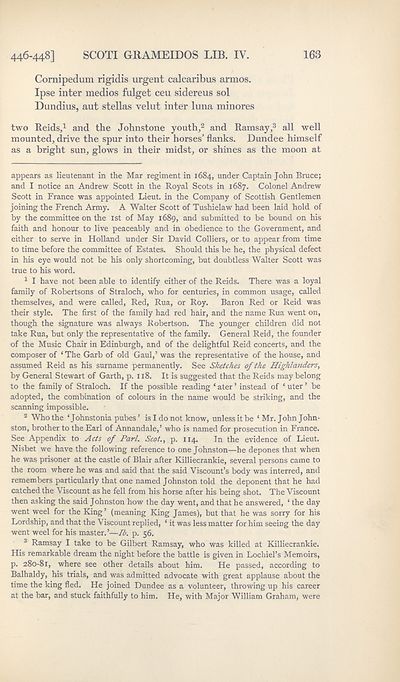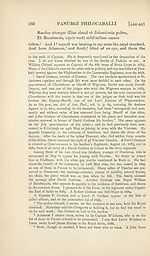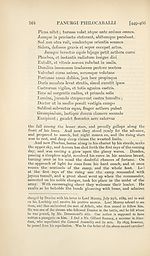Series 1 > Grameid: an heroic poem descriptive of the campaign of Viscount Dundee in 1689, and other pieces
(234) Page 163
Download files
Complete book:
Individual page:
Thumbnail gallery: Grid view | List view

163
446-448] SCOTI GRAMEIDOS LIB. IV.
Cornipedum rigidis urgent calcaribus armos.
Ipse inter medios fulget ceu sidereus sol
Dundius, aut stellas velut inter luna minores
two Reids,1 and the Johnstone youth,2 and Ramsay,3 all well
mounted, drive the spur into their horses’ flanks. Dundee himself
as a bright sun, glows in their midst, or shines as the moon at
appears as lieutenant in the Mar regiment in 1684, under Captain John Bruce;
and I notice an Andrew Scott in the Royal Scots in 1687. Colonel Andrew
Scott in France was appointed Lieut, in the Company of Scottish Gentlemen
joining the French Army. A Walter Scott of Tushielaw had been laid hold of
by the committee on the 1st of May 1689, and submitted to be bound on his
faith and honour to live peaceably and in obedience to the Government, and
either to serve in Holland under Sir David Colliers, or to appear from time
to time before the committee of Estates. Should this be he, the physical defect
in his eye would not be his only shortcoming, but doubtless Walter Scott was
true to his word.
1 I have not been able to identify either of the Reids. There was a loyal
family of Robertsons of Straloch, who for centuries, in common usage, called
themselves, and were called, Red, Rua, or Roy. Baron Red or Reid was
their style. The first of the family had red hair, and the name Rua went on,
though the signature was always Robertson. The younger children did not
take Rua, but only the representative of the family. General Reid, the founder
of the Music Chair in Edinburgh, and of the delightful Reid concerts, and the
composer of ‘The Garb of old Gaul,’ was the representative of the house, and
assumed Reid as his surname permanently. See Sketches of the Highlanders,
by General Stewart of Garth, p. 118. It is suggested that the Reids may belong
to the family of Straloch. If the possible reading ‘ ater ’ instead of ‘ uter ’ be
adopted, the combination of colours in the name would be striking, and the
scanning impossible.
2 Who the ‘Johnstonia pubes ’ is I do not know, unlessitbe ‘ Mr. John John¬
ston, brother to the Earl of Annandale,’ who is named for prosecution in France.
See Appendix to Acts of Pari. Scot., p. 114. In the evidence of Lieut.
Nisbet we have the following reference to one Johnston—he depones that when
he was prisoner at the castle of Blair after Killiecrankie, several persons came to
the room where he was and said that the said Viscount’s body was interred, and
remembers particularly that one named Johnston told the deponent that he had
catched the Viscount as he fell from his horse after his being shot. The Viscount
then asking the said Johnston how the day went, and that he answered, ‘ the day
went weel for the King ’ (meaning King James), but that he was sorry for his
Lordship, and that the Viscount replied, ‘ it was less matter for him seeing the day
went weel for his master.’—lb. p. 56.
3 Ramsay I take to be Gilbert Ramsay, who was killed at Killiecrankie.
His remarkable dream the night before the battle is given in Lochiel’s Memoirs,
p. 280-81, where see other details about him. He passed, according to
Balhaldy, his trials, and was admitted advocate with great applause about the
time the king fled. He joined Dundee as a volunteer, throwing up his career
at the bar, and stuck faithfully to him. He, with Major William Graham, were
446-448] SCOTI GRAMEIDOS LIB. IV.
Cornipedum rigidis urgent calcaribus armos.
Ipse inter medios fulget ceu sidereus sol
Dundius, aut stellas velut inter luna minores
two Reids,1 and the Johnstone youth,2 and Ramsay,3 all well
mounted, drive the spur into their horses’ flanks. Dundee himself
as a bright sun, glows in their midst, or shines as the moon at
appears as lieutenant in the Mar regiment in 1684, under Captain John Bruce;
and I notice an Andrew Scott in the Royal Scots in 1687. Colonel Andrew
Scott in France was appointed Lieut, in the Company of Scottish Gentlemen
joining the French Army. A Walter Scott of Tushielaw had been laid hold of
by the committee on the 1st of May 1689, and submitted to be bound on his
faith and honour to live peaceably and in obedience to the Government, and
either to serve in Holland under Sir David Colliers, or to appear from time
to time before the committee of Estates. Should this be he, the physical defect
in his eye would not be his only shortcoming, but doubtless Walter Scott was
true to his word.
1 I have not been able to identify either of the Reids. There was a loyal
family of Robertsons of Straloch, who for centuries, in common usage, called
themselves, and were called, Red, Rua, or Roy. Baron Red or Reid was
their style. The first of the family had red hair, and the name Rua went on,
though the signature was always Robertson. The younger children did not
take Rua, but only the representative of the family. General Reid, the founder
of the Music Chair in Edinburgh, and of the delightful Reid concerts, and the
composer of ‘The Garb of old Gaul,’ was the representative of the house, and
assumed Reid as his surname permanently. See Sketches of the Highlanders,
by General Stewart of Garth, p. 118. It is suggested that the Reids may belong
to the family of Straloch. If the possible reading ‘ ater ’ instead of ‘ uter ’ be
adopted, the combination of colours in the name would be striking, and the
scanning impossible.
2 Who the ‘Johnstonia pubes ’ is I do not know, unlessitbe ‘ Mr. John John¬
ston, brother to the Earl of Annandale,’ who is named for prosecution in France.
See Appendix to Acts of Pari. Scot., p. 114. In the evidence of Lieut.
Nisbet we have the following reference to one Johnston—he depones that when
he was prisoner at the castle of Blair after Killiecrankie, several persons came to
the room where he was and said that the said Viscount’s body was interred, and
remembers particularly that one named Johnston told the deponent that he had
catched the Viscount as he fell from his horse after his being shot. The Viscount
then asking the said Johnston how the day went, and that he answered, ‘ the day
went weel for the King ’ (meaning King James), but that he was sorry for his
Lordship, and that the Viscount replied, ‘ it was less matter for him seeing the day
went weel for his master.’—lb. p. 56.
3 Ramsay I take to be Gilbert Ramsay, who was killed at Killiecrankie.
His remarkable dream the night before the battle is given in Lochiel’s Memoirs,
p. 280-81, where see other details about him. He passed, according to
Balhaldy, his trials, and was admitted advocate with great applause about the
time the king fled. He joined Dundee as a volunteer, throwing up his career
at the bar, and stuck faithfully to him. He, with Major William Graham, were
Set display mode to:
![]() Universal Viewer |
Universal Viewer | ![]() Mirador |
Large image | Transcription
Mirador |
Large image | Transcription
Images and transcriptions on this page, including medium image downloads, may be used under the Creative Commons Attribution 4.0 International Licence unless otherwise stated. ![]()
| Scottish History Society volumes > Series 1 > Grameid: an heroic poem descriptive of the campaign of Viscount Dundee in 1689, and other pieces > (234) Page 163 |
|---|
| Permanent URL | https://digital.nls.uk/126598365 |
|---|
| Attribution and copyright: |
|
|---|
| Description | Over 180 volumes, published by the Scottish History Society, containing original sources on Scotland's history and people. With a wide range of subjects, the books collectively cover all periods from the 12th to 20th centuries, and reflect changing trends in Scottish history. Sources are accompanied by scholarly interpretation, references and bibliographies. Volumes are usually published annually, and more digitised volumes will be added as they become available. |
|---|


